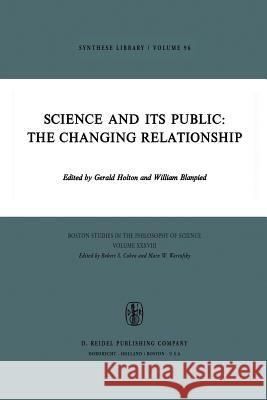Science and Its Public: The Changing Relationship » książka
Science and Its Public: The Changing Relationship
ISBN-13: 9789027706584 / Angielski / Miękka / 1975 / 296 str.
To STUDY the philosophy of science has always been a complex task, reaching to the methods and achievements of the sciences, to their histories and their contexts, and to their human implications. Sometimes favored by their social environment, sometimes dissenting from their Zeitgeist, the scientists have taken varying roles in the social spectrum, allied with differing interests, classes, powers, religions, evaluative outlooks. Philosophers should be interested as much in the changing social situations of science and of scientists as in the changing empirical findings and explanatory conceptions; recognition that rationality, experience, and inquiry have a history is no longer novel. Moreover the historical development of scientific perceptions of nature is linked-whether loosely or tightly--by the development of perceptions of science itself. Percep- tions of science are located not only in the self-awareness of scientists but also in the critical awareness of their fellow human beings. No doubt some friends or critics are more articulate than others, but the context for science has not been bland or neutral. Plaything, weapon, savior, hireling, magician, devil, priest, the stereotypes of science and scientist are neither the simple result of plain ignorance nor the obvious reflection of some successes and some failures of the scientific enterprise. Public perceptions of science have great importance for understanding both the public in society and the sciences at the stage per- ceived.











